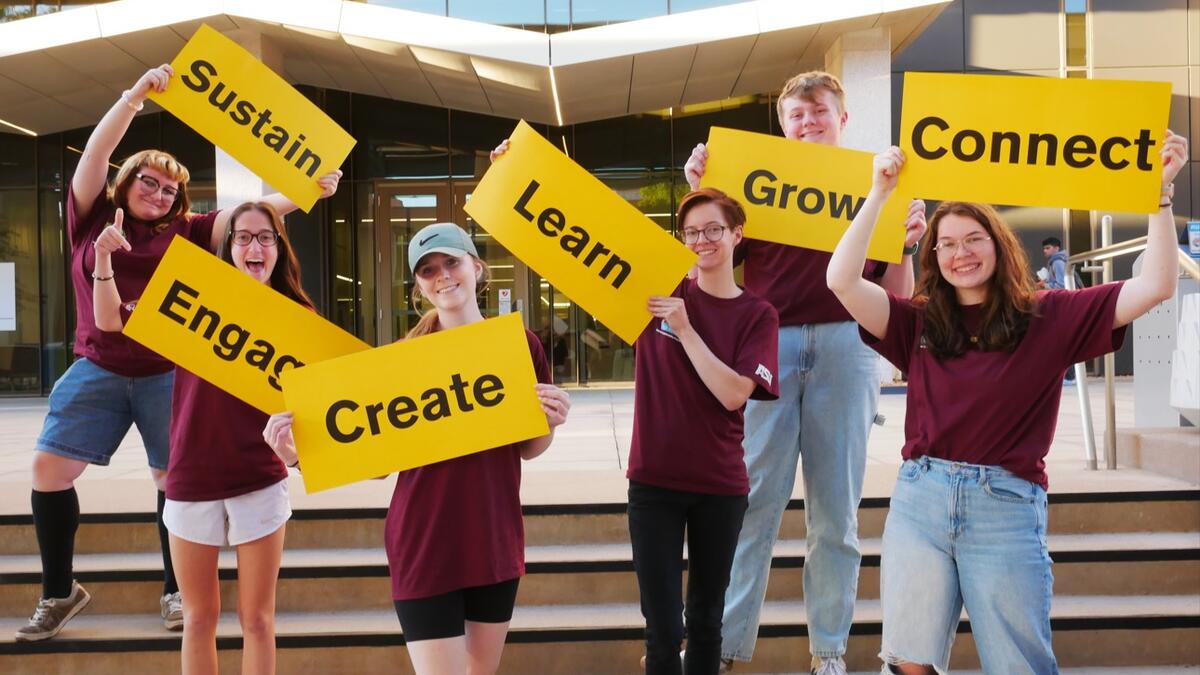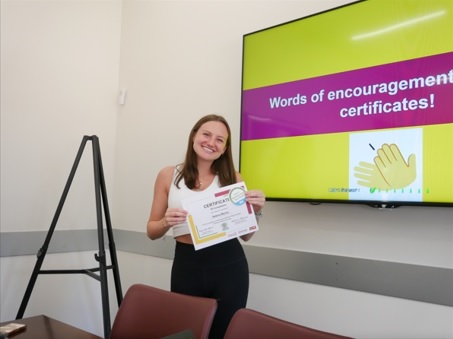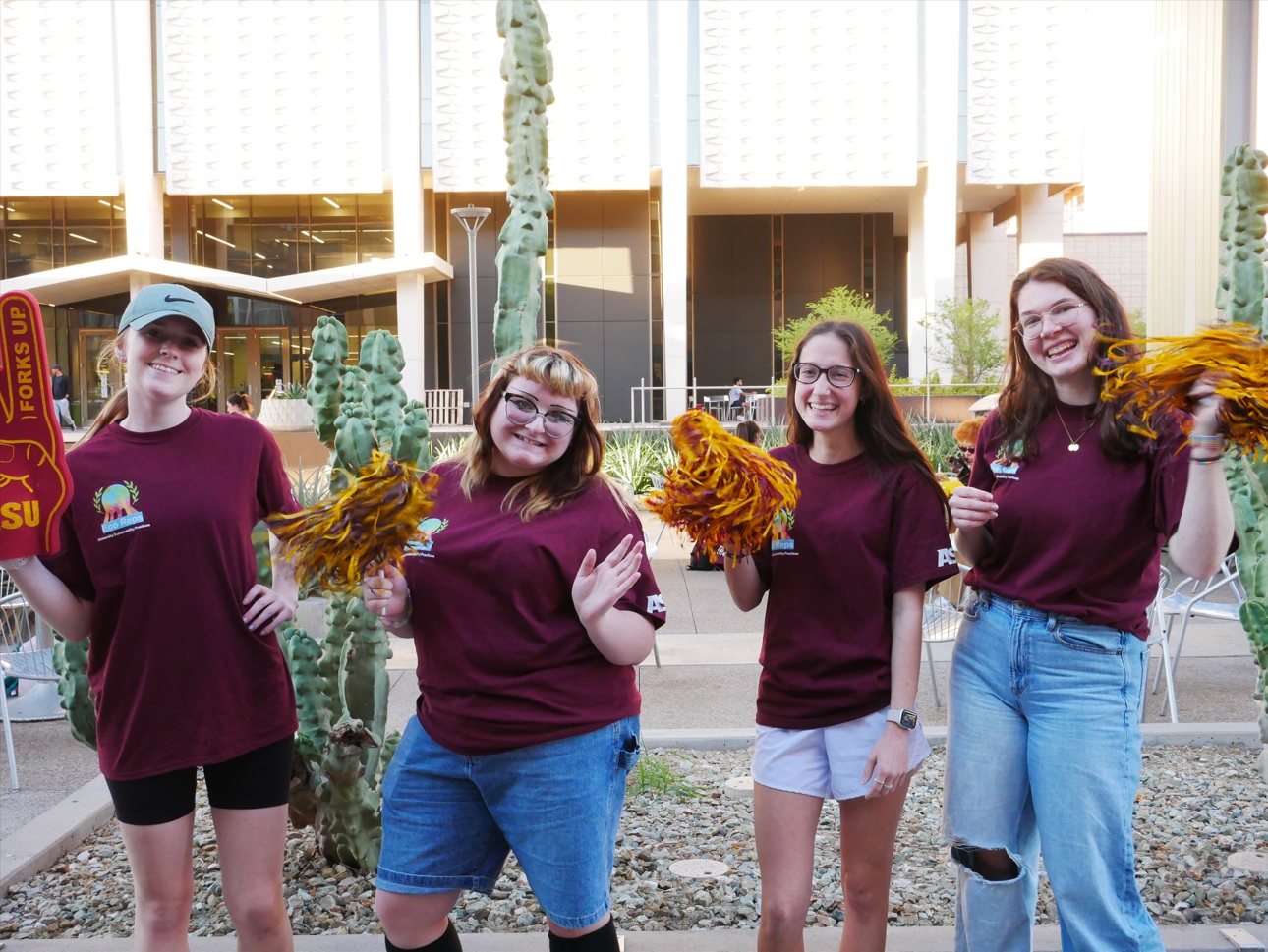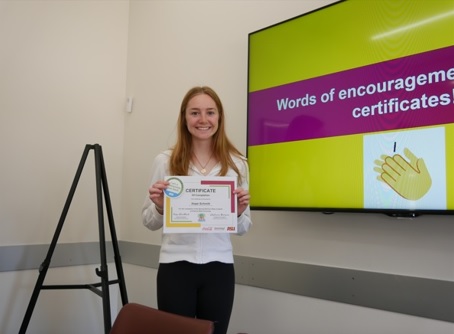Eco Reps program inspires ASU students to be stewards of sustainability

When Selena Morse began scuba diving at age 10, the beauty of marine life wasn’t the only thing she encountered – the amount of human-produced waste floating around among schools of brilliant blue damselfish and bits of plastic being nibbled by unassuming puffer fish was more than a little disheartening.
The experience sparked Morse’s interest in sustainability, something she brought with her to Arizona State University as a double major in supply chain management and sustainability leadership.
“One of the reasons I decided to come to ASU was because of the sustainability practices already in place on campus and all the research being done on it here,” Morse said.
Supply chain management and sustainability leadership double major Selena Morse served as an Eco Rep during the spring 2023 semester. Photo courtesy Paige Strickland
Like many students, when she arrived on campus, Morse sought out opportunities to engage with like-minded individuals. That’s when she discovered the Eco Reps program.
Piloted in fall 2022 by University Sustainability Practices, the program is funded by strategic partner Coca-Cola to train student representatives to serve as stewards of sustainability for their residential communities.
Each semester, 15 students from the Palo Verde West, Palo Verde East, Barrett and Manzanita Halls are selected to serve as Eco Reps.
Paige Strickland and Stephanie Georgiou, program coordinators for University Sustainability Practices, oversee the program and wrote the training materials for students, which include a digital guidebook that contains contributions by university partners Zero Waste and Aramark.
“Since students from all academic backgrounds are encouraged to apply, we set a basis of understanding by teaching students the basics of topics including waste minimization, food waste, energy, water, global sustainability, transportation and more,” Strickland said.
Students also learn about best methods for engaging with peers through community-based social marketing and complete the Seeds of Sustainability training, offered through University Sustainability Practices.
The students then take what they learn and share it with their peers through weekly interactive activities and events. Eco Reps receive a sustainable kit of materials to be used throughout the semester as incentives and giveaways, including metal straws, reusable silicon bags, shower timers, reusable utensil kits and bamboo toothbrushes.
Last semester, conservation biology major Bea Scott served as the inaugural Eco Rep for Manzanita Hall, organizing a clothing swap to teach fellow students about sustainable fashion practices and designing a poster with a QR code students could use to calculate their carbon footprint, among other engagement activities.
ASU students Erin Schleusner (far left) and Bea Scott (second from left) served as part of the inaugural Eco Reps cohort during the fall 2022 semester. Photo courtesy Paige Strickland
The experience has inspired Scott to switch her major to sustainability.
“I feel prepared to go into a sustainability major now, and it’s been an awesome way to connect with people and just learn more about how I can help the Earth,” she said.
Business data analytics major Erin Schleusner also served as an Eco Rep during the inaugural semester.
“Seeing as I am majoring in business data analytics, taking an analytic and data-driven approach to sustainability and sustainable practices is something that I really want do in my future career,” she said. “So kind of making a hybrid out of my passion for sustainability and my experience in Eco Reps, as well as my education in business data analytics, I think will set me up well in my career.”
Following a successful first semester, the program continued in spring 2023.
One of Morse’s favorite activities this semester was a sustainability scavenger hunt, where she and other Eco Reps like architecture major Hope Schmitt guided students to discover various sustainable points of interest on campus, such as water refill stations and bike racks, to encourage them to cut back on car transport.
Architecture major Hope Schmitt served as an Eco Rep during the spring 2023 semester. Photo courtesy Paige Strickland
"Given my major, I really want to be involved in sustainability, for the sake of the future of the planet,” Schmitt said. “We need to make sure we’re building sustainable practices into the function of buildings, from plumbing to waste management.”
That was something she had the chance to learn more about during a group Eco Reps activity touring some of ASU’s many LEED-certified buildings.
“The Eco Reps program gives me the ability to put that knowledge into practice and learn more about it so that I can incorporate it in my personal life and future career,” Schmitt said.
During Earth Month on April 20, University Sustainability Practices will be hosting its annual Earth Festival event, where interested students can learn more about the Eco Reps program, as well as a variety of student groups that promote sustainability.
Strickland is encouraged by the success of the program and hopes to see it continue to grow its reach across the university.
“I want the Eco Reps program to be known as a strong community, where students from every background can come together behind the mission of galvanizing campus sustainability and educating their peers on issues that will affect them the most in the future,” she said. “I also want to collaborate with other campus departments and student groups to make the program as intersectional as possible.”
Top photo: Bea Scott (far left), Erin Schleusner (third from left) and other student Eco Reps served as the inaugural cohort during the fall 2022 semester. Photo courtesy Paige Strickland. ASU News Student Reporter Lillie Boudreaux contributed to this story.
More Environment and sustainability
Meet the young students who designed an ocean-cleaning robot
A classroom in the middle of the Sonoran Desert might be the last place you’d expect to find ocean research — but that’s exactly what’s happening at Harvest Preparatory Academy in Yuma, Arizona.…

From ASU to the Amazon: Student bridges communities with solar canoe project
While Elizabeth Swanson Andi’s peers were lining up to collect their diplomas at the fall 2018 graduation ceremony at Arizona State University, she was on a plane headed to the Amazon rainforest in…

From environmental storytelling to hydroponics, student cohort crafts solutions for a better future
A select group of students from Arizona State University's College of Global Futures, a unit within the Julie Ann Wrigley Global Futures Laboratory, is laying the foundation to drive change…




